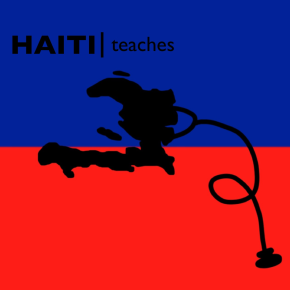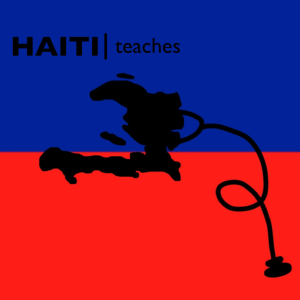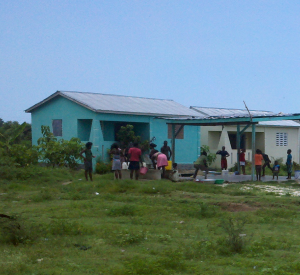 So as I wrap up a great weekend with some old friends, I finally have a minute to reflect on my first few days in Haiti, looking at the past and possibilities for the future.
So as I wrap up a great weekend with some old friends, I finally have a minute to reflect on my first few days in Haiti, looking at the past and possibilities for the future.
Being back in Haiti is always a shock to the senses. The second you leave the airport your senses are put on overdrive: the cacophony of cars and people; the hot, wet air; the smell of dust, trash and cane; and of course the mosaic of colored tap-taps, mango trees and vendors. It’s been almost a year and a half since I’ve been back and I couldn’t be more excited.
The first thing that struck me was the closure of some very high profile internally displaced persons (IDP) camps. For a number of years following the earthquake, the presence of makeshift camps had been ubiquitous. And, suddenly, a huge amount of them are gone. In their place are tall fences surrounding open land that illustrate the government’s fear of ever going back to these semi-permanent settlements.
 After the initial emergency phase ended, it became rapidly clear that managing the millions of displaced persons in Port-au-Prince and beyond would be an ominous task. The quagmire of land rights, building materials, vulnerable populations, incentives via humanitarian aid for staying in camps and an utter lack of space put the issue at the top of the list. The solution finally came in the form of payments to families (which followed forced removal) as a way to subsidize rent that would be required once leaving the camp. These payments last for one year, followed by small grants that will be used for initial investments that one day may make families autonomous in rent payment and livelihood. Obviously, the success of this program relies on a variety of factors that might just not work out. The precociousness of this position for many families is far from some theoretical plan drawn up in a boardroom in Geneva; it is a real struggle that may mean the difference between life and death.
After the initial emergency phase ended, it became rapidly clear that managing the millions of displaced persons in Port-au-Prince and beyond would be an ominous task. The quagmire of land rights, building materials, vulnerable populations, incentives via humanitarian aid for staying in camps and an utter lack of space put the issue at the top of the list. The solution finally came in the form of payments to families (which followed forced removal) as a way to subsidize rent that would be required once leaving the camp. These payments last for one year, followed by small grants that will be used for initial investments that one day may make families autonomous in rent payment and livelihood. Obviously, the success of this program relies on a variety of factors that might just not work out. The precociousness of this position for many families is far from some theoretical plan drawn up in a boardroom in Geneva; it is a real struggle that may mean the difference between life and death.
As the aid money has all but dried up in the areas hit hardest by the earthquake and once flush with cash, such as Leogane, people are forced to pick up the pieces and find a way to survive. The problem with so much of the international aid spent today is so quintessential of our current society. As John Womack puts it, our culture
“changes every real, complicated, painful struggle into a brief sensation of stars, or meteors, gloriously noble or wicked, always somehow erotically intriguing today, dead boring tomorrow”
The same is true with aid, and probably with Haiti. We all love the pictures of helicopters flying in and air-dropping food to desperate people, but these things do little to solve the long-term problems that created the crisis in the first place. And, if you dig a bit deeper and look at the historical relations between our country and theirs, it is increasingly difficult to justify the perennial “we can’t solve every problem out there” argument.
So, as young people who do care about health inequities, where can we pitch in? Firstly, we have to give the reins to our Haitian partners. The evaporation of aid post-earthquake is such a telling example of how important it is that institutions, not photo opportunities, are built with our assistance. Once we leave, if our work is to have a real impact, the strategy must be owned by Haitians and built by them.
In practice, how do we do this? Here is an example. Although I will be heading to the other side of the country today to work in the H.O.P.E. hospital, I have to be honest with myself that the work is primarily benefiting me. I am receiving the training and clinical exposure and have little to offer in the way of services. However, before I left Leogane my partners showed me sites where they want to scale up projects they have already started. I may want to be cracking the next drug-resistant strain of tuberculosis, but what my Haitian colleagues are telling me they need is housing and family planning. These are the interventions that are important for their community’s long-term survival and economic success.
Housing is a huge issue in Haiti because of the financial hemorrhaging that yearly rent bleeds from a family. This is money that could be used to start a business and grow a fledgling economy like that in Leogane. Indeed, all the real progress I have seen since I have been back is Haitian-led. Three years on, practically no emergency food and shelters items remain, but the small businesses that are sprouting everywhere are significant and offer real hope for the future.
Family planning is a similar need. Many women would prefer to only have three children, but access to quality health care tips the balance in vulnerability that yields families with seven or more children and the resources for their development that just aren’t there. Instead, with targeted interventions in family planning, families can manage their resources more efficiently to build a life for themselves and create jobs for the community.
In Haiti, you can’t exist without asking questions about how to improve society. Everyone talks about it all the time: from physicians to farmworkers to mototaxi drivers to gangsters. Though I had envisioned being on vacation this past weekend, most of our time was spent looking at and talking about new projects. The changes must be Haitian-led, but we can help. A colleague of mine has just finished a review of Paul Farmer’s new book How to Repair the World, which talks about this very point in a far more articulate way than I’ll ever be able to do.
For now, I will be spending the afternoon catching up on emails and getting ready to take a flight to Cap Haitian and from there I’ll take a car to Borgne where the real work will begin. Thanks for staying tuned in.
Haiti Teaches is a column that explores the opportunities, nuances and conflicts associated with time spent as a medical student in a foreign country. It follows a second-year medical student before, during and after his two months with a community development organization in Borgne, Haiti.


